|
CHAPTER I.
THE FIRST EXPERIMENT
IN the summer of 1856 the first experiment in co-operative trading
was made in Greenfield. A small sum of money was subscribed with
which were bought in bulk such goods as sugar, treacle, candles, and
soap. These were delivered at the Old Press Shop at Greenfield Mill
and sold at retail prices to those who had shown an interest in the
experiment.
The experiment was so fruitful and beneficial in its results that
meetings were afterwards held at Hey Top with the object of
discussing the formation of a co-operative society in Greenfield.
The driving force behind all this was no doubt Mr. Joseph Wood in
whose house the meetings were held. The final result of these
meetings was the formation of the Greenfield Industrial and
Benevolent Co-operative Society Limited. The date of its
establishment was given as October 6th, 1856.
The rules of the society were first certified on
January 2nd, 1857, to be in conformity with law and with the
provisions of the statute relating to Industrial and Provident
Societies. These rules were signed by Abraham
Whitworth, Jonas Rushworth, and James Bottomley as members and
Joseph Wood as secretary. The address of the society was given as
“Society’s Store, Greenfield, Saddleworth.” The rules were later
registered on November 25th, 1862, under the I. and P. Act of 1862
and in September, 1873, the name of the society was changed to the
one now in use.
At a meeting held on February 5th, 1857, by the newly registered
society the following persons were elected as officials: Treasurer,
Abraham Whitworth; Secretary, Joseph Wood; Three Trustees, Ralph
Schofield, James Rushworth, and Thomas Swallow; Committeemen, James
Schofield, Joseph Hall, James Wrigley, James Bottomley, Frances
Bradbury, Daniel Worth, Robert Mellor, George Walton, and Edward
Heap; Auditors, Jonathan Winterbottom and Abraham Whitworth;
Arbitrators, John George Buckley, Samuel Wrigley Robert Schofield,
Joseph Underwood, and James Heap.
It is not stated who acted as chairman at this meeting but the
minutes of subsequent meetings were signed by Jonathan Hirst, who
was formally elected as chairman on April 20th, 1857. No
remuneration seems to have been paid to the committeemen until 1862,
when it was resolved that they receive “3d. each per week for their
services if in time.”
One hundred years ago life for the people of Greenfield must have
been rather grim and bleak. Wages were paid monthly, a custom which
would surely encourage going into debt. Working hours were long and
wages were low. The wages of adult male workers at Greenfield Mill
for a working week of 60 hours did not exceed 14s. “Millers” were
paid 17s. 6d. a week, which began at midnight on Sundays and ended
on Saturday afternoons at 4 o’clock. The only break allowed was for
meals and two hours’ sleep at night.
Such was the social and economic background of the formation, not
only of our society, but of the many societies which were formed in
various parts of Yorkshire and Lancashire. It was not merely a
matter of opening a shop for the purpose of buying and selling
goods. The objects of a co-operative society were wider and deeper
than all that.
The wage-earners wanted their wages to go further, they wanted a
fairer deal; behind their minds lay the idea that through
co-operation a juster and healthier social order could be created.
It was looked upon as an instrument of social change. However dim
that idea may be in the minds of the present generation of
co-operators it is nevertheless true to say that the objects of the
co-operative movement are to create a better social order. Whenever
the movement loses sight of this ideal it has lost its soul.
The social purpose of co-operative societies is even expressed in
the names under which they were originally registered. The word
“co-operative” does not appear in the Acts of Parliament which
govern our operations but societies registered themselves as
“Industrial,” “Benevolent,” “Friendly,” “Equitable,” “Provident,”
thereby plainly stating their objects.
The first shop was opened in February,1857, in a house at
Piccadilly, near the King William Hotel. The rent paid for the use
of the house was 3s. 6d. per week. It was open in the evenings only,
from 7-30 to 10-30 p.m., but on Saturdays remained open until 11
p.m. Members of the committee seemed to have worked in the shop.
The committee exercised detailed control over the management of the
store, decided what goods should be bought and the price at which
they should be sold. They selected the persons who should buy these
goods and instructed them to take money with them to pay for the
goods they bought. These men went to Manchester, Oldham, Ashton,
Rochdale, Marsden, and Huddersfield.
The year 1858 seems to have been a year of doubt and misgiving. The
shopman proved unsatisfactory, and it was resolved that he “be
turned away from the store.” Stock was taken over and over again to
make sure everything was all right. So serious seems to have been
the position that at the general meeting held on April 29th the
question was considered whether to continue with the business or
not. There were 33 members present; 17 voted in favour of carrying
on, two against, and the remaining 14 could not make up their minds
what to do and remained neutral. The decisive factor influencing the
vote was no doubt the payment of a dividend of 10d. in the £ and the
payment of 5 per cent interest on share capital. In 1858 the first
coal was sold at 5½d. per cwt. The society also began its first
system of transport by hiring a donkey at 5s. per week.
In 1859 the shop was removed to the house at Spring Grove. The
shopman and his wife lived on the premises and gave up an unused
bedroom for the purpose of storing some of the stock. This year a
dividend of 1s. 3d. in the £ was paid.
A feeling of confidence and security must have prevailed in 1860 for
it was decided that the time had come for the society to own its own
shop. Land was bought where the Central premises now stand and a
shop and two houses were erected thereon. This was a bold decision
to take, for at this time the Society had only 136 members, the
sales were less than £70 per week, and the capital available was
only £1,561. The gloom of two years ago had evidently been
dissipated and one of hope and confidence had taken its place.
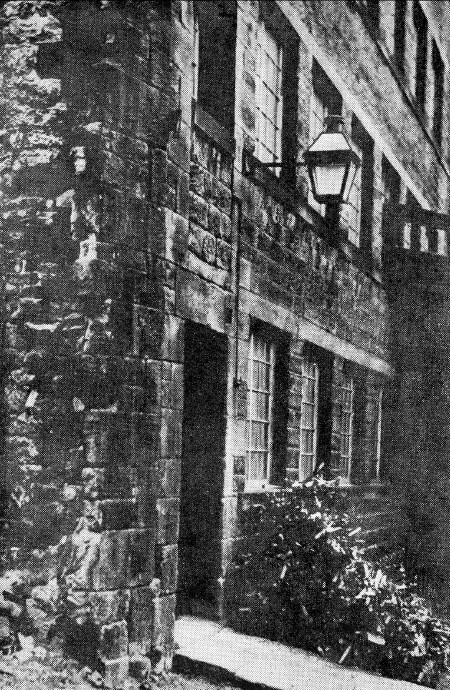
The Old Press Shop
where the first sales were made.
The members had a robust faith in the work they had in hand and no
doubt they would be surprised if they could know that 94 years later
these premises would still be serving as the Central store. The shop
was eventually opened in 1862 as can still be seen on the sign over
the archway. It is interesting to note that the land was conveyed
not to the society but to trustees. A co-operative society could not
at that time own property in its own name. The original deed is
still in our possession. The dividend this year was 1s. 4½d. in the
£.
With the enrolment of the C.W.S. in August, 1863, occurred the most
important and decisive event in the history of the British
Co-operative Movement. Business of the new society began in March,
1864. In 1862 it was stated in the House of Commons that there were
150 societies in existence doing an annual trade of £1½ million. Most of these societies were situated in Lancashire and Yorkshire. Several attempts had been made in various parts of the country to
establish a wholesale buying agency.
In 1856 the Rochdale Society opened a wholesale department, but
after suffering losses it was closed after three years. Greenfield
Society frequently bought goods from the Rochdale store and
according to a minute made in May, 1858, became a member of it. The
first purchase was made in February, 1857, when Mr. George
Winterbottom was authorised to go to Rochdale and take £15 with him
and give them an order.
By the passing of the Industrial and Provident Societies Act of 1862
permission was given to societies to form federal societies with the
proviso that no society could invest more than £200 in such
federations. This limitation was removed by the amending Act of
1867. Greenfield was soon aware of the advantages which would accrue
from the establishment of a wholesale society, for on November 18th,
1863, it was resolved that the society take up 140 shares in The
North of England Co-operative Wholesale Industrial and Provident
Society Limited and that the society be represented at the first
general meeting of the new society.
It is pleasing to recall that in the first balance sheet of the
C.W.S. the name of Greenfield appears among the list of 54 member
societies. Our trade for the six weeks’ period covered by the
balance sheet amounted to £233 and our invested capital is shown as
£7. Our resolve to support the new society is indicated by a
resolution passed at a special general meeting recommending the
committee to make as many purchases as possible from the wholesale
society.
Progress continued to be made. Drapery goods had been sold along
with grocery and provisions; then one of the houses was used for
this purpose and the second
house was opened as a butchering department.
In 1879 it was decided to build separate premises for these
departments. By the end of the year the present building, which
comprises drapery and butchering and the hall, was completed. The
opening ceremony was attended by 500 persons. The lower hall was
used for several years as a grocery storeroom. The halls have played
a very important part in the social life of the village, having been
used for the society’s own business purposes, by its educational
department, for concerts, social evenings, lectures, bazaars,
theatrical performances, and public meetings for all political
parties. Many famous men have spoken in these halls.
In 1913 an important change in the law took place regarding the
qualifications of auditors. Up to this time a layman could be
appointed auditor. In Greenfield it had long been the custom to
appoint the headmasters of the Schools in the district to act as
auditors. These men were held in high regard and esteem by the
members and discharged their duties faithfully and honestly. But
considering the growth and expansion of the activities of the
movement Parliament decided that the duties of auditor could only be
carried out efficiently by men with the necessary qualifications. Our society anticipated this change in the law and appointed in 1908
Messrs. Appleby and Wood as their first Public Auditors, these were
succeeded in 1917 by Mr. (later Sir Thomas) Broderick of the C.W.S.
Ltd.
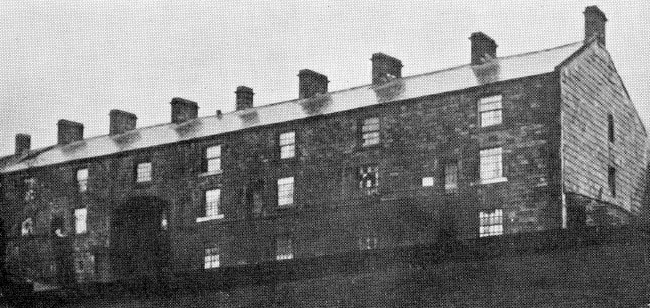
Hey Top where the first meetings were held.
There were no further developments on the trading side until 1914. With the occupation of the new buildings the house used as a
butcher’s shop reverted to a dwelling house. The second house was
used as an extension of the grocery shop. Additions were made at the
back for additional storage accommodation, and the slaughter-house
and stables in the yard were rearranged. The committee devoted much
of their time to the building of dwelling-houses for the members but
something will be said of these developments later on. |
――――♦――――
|
CHAPTER II.
THE GOLDEN AGE
IN 1890 the average dividend rose to 3s. 0½d. in the £ and only on
two occasions during the course of the next twenty years was it to
fall below 3s. in the £.
To some co-operators this period is looked back upon as the Golden
Age of co-operation; to others, perhaps wiser people, it is looked
back upon as a period of wasted and neglected opportunities. Lower
prices could have been charged for goods during this period or more
could have been put to reserves. The latter would have strengthened
the financial position with the ultimate result of lowering
operation costs.
On July 21st, 1900, the society celebrated its Jubilee. This was a
great day for the people of Greenfield and a memorable one for the
members of the society. The streets were decorated with both
streamers and flags. Two bands were engaged — the Boarshurst Band
and the Greenfield Reed Band. One of the largest processions ever
seen in the village marched from its meeting place, via Nook Steer,
to Horsforth, then to Frenches and back to Road End where a halt was
made and appropriate speeches were delivered.
Among those taking part were some of the surviving founders of the
Society. One thousand six hundred people were provided with tea in
two large marquees. This was followed by sports and entertainment. Each member was presented with a copy of the
Jubilee History,
written by Mr, David Lawton, secretary of the Society.
The writer is very much indebted to this excellent book. The cost of
these celebrations was £229, of which £168 was taken from the
reserve fund.
In 1904 the Co-operative Insurance Society Ltd. introduced the
Collective Life Assurance Scheme. Under this scheme the lives of the
members, their wives or their husbands, are insured at no direct
cost to themselves. On their decease a grant is payable, the amount
of which depends entirely on the average amount of purchases which
have been made by the member during the qualifying period.
The benefits are at the rate of 5/- in the £ for a single person,
widow or widower, maximum benefit £50. At the rate of 4/- in the £
for a husband, maximum benefit £40, and at the rate of 2/- in the £
for a wife, maximum benefit £20. Our society joined the scheme in
1909 and since that time has paid 1,233 claims amounting to £10,607. Premiums paid by the society amount to £10,004. The highest single
claim paid by us is £50. 4s. 3d.
This scheme has no doubt proved of great benefit to our members in
helping them to meet the heavy expenses which inevitably arise on
the decease of a member. The idea of the promoters of the scheme was
that by offering such benefits to co-operative members they would be
encouraged to increase their purchases with their society. It is
doubtful however whether it ever had this effect and is still more
doubtful now that the state pays a death grant. Nevertheless it is
still of great value to our members.
Since 1904 the Co-operative Insurance Society has paid 2,517,771
claims amounting to £21,982,039.
On May 10th, 1910, the resignation of the manager, Mr. Dan Holden,
was accepted with great regret by the committee, and Mr. Frank Lees
was appointed to take his place. At a joint special meeting of the
general and education committees an address was presented to Mr.
Holden in recognition of the valuable services he had rendered to
the society during his period of office covering 38 years.
It recorded the fact that he took up the position in 1872 when the
fortunes of the society were at their lowest ebb and by his untiring
efforts he had greatly helped to make it the success it was. The
address also recorded their appreciation of the services he had
rendered to the educational work of the society which began in 1892,
and it wished him good health and a long life in his retirement. The
address was signed by the presidents and secretaries of the general
committee and education committee respectively.
In August, 1913, it was decided to purchase land at Oak View in
order to erect a branch shop which would serve the members in the
Horsforth area.
The secretary of the society was invited to lay the right hand
corner stone of the new branch. This was done on Monday, April 20th,
1914.
A suitable and appropriate speech was made by the president, Mr.
George Booth, in inviting Mr. Lawton to lay the stone. In reply Mr.
Lawton thanked the committee for the honour they had conferred upon
him and declared the stone duly laid. Then the President presented
him with a beautiful watch as a memento of the occasion. On a
fateful day in the history of mankind the shop was opened on
Saturday, August 1st, 1914, for Germany had declared war against
Russia, and the British Empire was to enter the war three days
later. Nevertheless, the opening ceremonies were duly carried out.
The two Greenfield bands were engaged. There was a procession round
the village.
The only surviving pioneer of the society, Mr. James Wrigley, was
invited to be present, and Mr. Henry Hudson presided at the actual
opening ceremony. Eight hundred and twenty samples of C.W.S.
productions were ordered for free distribution among the members at
a cost of 2s. each to the society.
We were now at war and within one month the committee had decided to
recommend to the members that prices of goods be reduced and a
uniform dividend of 1s. in the £ be paid.
This recommendation was turned down by the members at the general
meeting held on October 5th. The members had evidently a surer grasp
of realities than the committee. The society was still paying a 3s.
dividend, the members were obviously well satisfied with leaving
things as they were and perhaps one cannot blame them for
disapproving of the recommendation. At the same meeting £10 each was
granted to the National Relief Fund, the Belgian Relief Fund, and
the Local Fund.
Prices of commodities were evidently causing concern to the
committee for in June, 1915, they decided to send a letter to the
Prime Minister and the local Member of Parliament protesting against
the high prices of the ‘necessaries of life.’ Long before the
Government saw the necessity of rationing many co-operative
societies introduced some measure of control over the distribution
of goods which were in short supply in order to ensure that the
members had a fairer deal.
The co-operative movement suffered many grievances during the war:
goods were allocated on the basis of pre-war trade, this was
obviously unfair as its trade and membership were continually
growing. It was also difficult to obtain exemption from military
service for key men in its employment. Our society frequently
employed a solicitor to state our case before the Military
Tribunals. Then resentment was felt over the imposition of the
Excess Profits Tax. In addition, when controls were introduced the
individuals appointed as controllers were usually men associated
with vested interests and private trade.
The result of all these grievances was the decision in 1917 that the
movement should have direct representation in Parliament. This was
not a new or a novel idea to the members of our society for so long
ago as 1898 a general meeting had approved the principle of
parliamentary representation and in 1917 the proposal was again
approved.
At a committee meeting in October the secretary of the society, Mr.
Lawton, was taken ill and he passed away in April, 1918. He was the
first full-time secretary and cashier and was appointed to this
position in 1887. He was at that time a member of the committee. For
31 years, therefore, he served the society with great credit and
distinction. He was also for a number of years secretary of the
Oldham District Co-operative Association. He was appointed a Justice
of the Peace which was at that time a rare honour for a working man,
He was also author of our excellent Jubilee History.
Appointed as his successor was Mr. Phillip Robinson, of Preston, who
stayed with us for about three years and who later became, and still
is, a director of the C.W.S. Ltd.
Mr. Robinson was succeeded by Mr. W. G. Hobson, the author of this
short history of the society, who has still the honour of holding
the position.
After the war ended developments on the trading side were made in
rapid succession, fish and fruit, Frenches grocery, and milk
delivery. Evidently the famous phrase of making a land fit for
heroes to live in had seized the imagination.
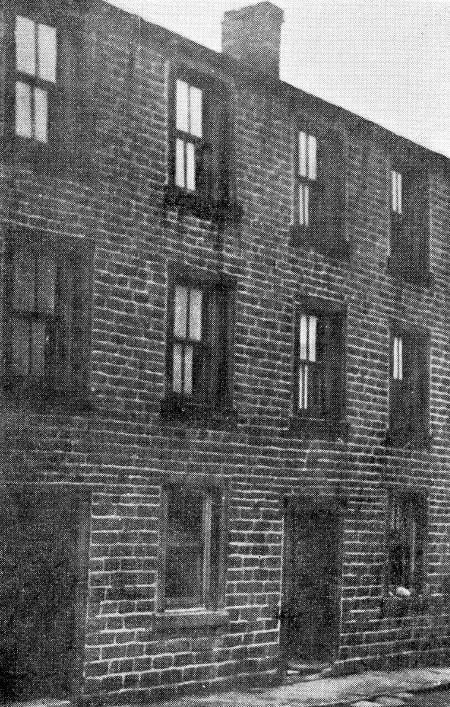
Piccadilly
our first shop
A shop in Kinders Lane was bought in which the fish and fruit
department was opened in 1919. Within a very few years the trade had
so much developed that it was found necessary in 1924 to double the
size of the shop.
In 1920 it was decided to open a branch at Frenches. This addition
has proved very useful and convenient for those members living in
this area, and with the development of the housing estate at Carr
Lane it should still prove more useful than ever. In 1955 minor
improvements were made to make the shop more attractive to our
members. |
――――♦――――
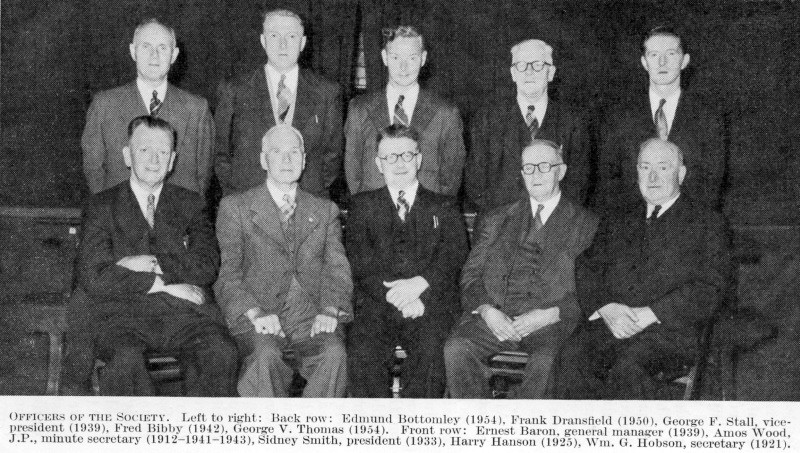
|
CHAPTER III.
CO-OPERATIVE SERVICES
AT the general
meeting in April, 1921, the committee were instructed to go into the
question of starting a milk delivery service. It is interesting to
note that already on this question the committee had asked the
farmers’ association to send a deputation to meet them to discuss
ways and means of establishing a co-operative milk delivery service. Eight gentlemen came to see them, but nothing resulted from the
meeting.
However, in conformity with the instructions of the general meeting,
the committee lost no time on the matter and the society entered the
milk business forthwith. For the first few years liquid milk was
bought from the Congleton Depot of the C.W.S. The milk was delivered
over a wide area; we had customers residing in Uppermill and Diggle. Later on supplies of pasteurised milk in bottles were obtained from,
and delivered on our behalf by, the United Co-operative Dairies Ltd. This system continued in operation until the outbreak of the second
World War when, owing to the restriction in petrol supplies, we had
to undertake delivery ourselves.
In 1952 we became shareholding members of the Dairies and they are
now entirely responsible for its delivery.
The question of having a federal bakery in Saddleworth had been the
subject of discussion for many years, with the object of the
societies obtaining their supplies from their own bakery instead of
drawing them from the Oldham Equitable Society. At the animal
meeting of members, held in January, 1920, the committee recommended
that the formation of a joint bakery be considered, but the members
did not approve of the suggestion.
In August of the same year an inspection of the bakery at New Moston
took place. The question was again considered at the general meeting
held in October, and this time the matter was left in the hands of
the committee; the subject was again discussed at the general
meeting held in January, 1921, but with no result.
In 1924 a meeting of all the committees of the Saddleworth
Societies was held in Uppermill to discuss a federal bakery. The
result of this meeting was that the Greenfield Society informed the
joint committee, the conveners of the meeting, that they did not
agree to a federal bakery but had decided to erect one of their own. This decision was a great surprise and disappointment to the other
societies.
Fortunately we had land available adjoining our Frenches branch, and
on this land a bakery and a confectioner’s shop were erected. When
one considers that our trade in bread and confectionery at this time
only amounted to about £25 per week it was a risky business to
undertake. Nevertheless, it has so far proved a success and the
action of the committee has been fully justified. We are quite aware
of the difficulties that may lie ahead and we know full well that
nearly all the experts in the bakery trade assert that the days of
the small bakery are over.
It is interesting to note that so long ago as 1883 the committee
convened a special meeting of members to consider the opening of a
bakery department. A bakery in those days would be a rarity.
Fortunately the members decisively turned the proposal down. More
than forty years were to pass before a bakery department was opened.
In 1933 an important change in Income Tax Law was made which
rendered co-operative societies liable to pay tax under Schedules C
and D. The Industrial and Provident Societies Act of 1862 had placed
co-operative societies on a level with friendly societies by
exempting them from income tax under these schedules. They were,
however, liable as owners and occupiers of property to pay under
Schedules A and B and remained so until 1933 whether any profit was
made or not.
The contention of co-operators had always been that no profit in the
true meaning of the word could be made by co-operative societies. The distribution of “profit” as dividend on purchases to members
could only be regarded as a deferred discount. This view was upheld
by the Royal Commission which reported on this question in 1920 and
this Commission therefore stated that no case had been made out for
a change in the law.
After the election in 1931 of the Coalition Government a small and
“independent” Commission was appointed to report on the matter. The
Commission consisted of only three persons and they recommended in
favour of the taxation of co-operative societies, but recommended
also that the dividend paid to members on their purchases should be
exempt. We are now liable to pay tax on any sums of money placed to
reserves, but however much a society increases its reserves the
value of any individual shareholding does not increase. It always
remains the same. The effect of this tax has been that societies
have been reluctant to increase their reserves.
One of the most important events in the history of co-operation in
Saddleworth took place in 1933, the amalgamation of the Grasscroft
and Greenfield Societies. Many co-operators are of the opinion that
there are too many co-operative societies in the district, and the
question of one society for the whole of Saddleworth is the ideal to
be aimed at. But apart from the formation of a joint committee of
the societies no real effort was ever made to bring amalgamation
about.
At the general meeting of July, 1918, the committee gave notice that
at the next general meeting the question of amalgamating with the
Grasscroft Society would be considered, when this meeting was held
it was announced that a letter had been received from the Grasscroft
Society stating that they were not interested in the question. So
the subject was not discussed.
At a committee meeting in April, 1920, it was noted that a
deputation from the Grasscroft Society had been interviewed and it
was resolved that a sub-committee be formed to go into the question
of joining up with Grasscroft, the Greenfield committee being
unanimously in favour of amalgamation. The result of all this was
that at the next general meeting of the society the president moved
that steps be taken to effect amalgamation. After much discussion
the motion was defeated by 53 votes against 20.
The next step taken in this matter was the receipt of at letter in
the autumn of 1933 from the Co-operative Union Ltd. asking the board
to meet two of their representatives. They came on October 30th and
asked us to meet the Grasscroft committee to consider the question
of amalgamation. The Grasscroft Society had written for advice on
this matter.
Several meetings of the two committees were held and they finally
arrived at the unanimous decision to call a special general meeting
at each society and put the necessary resolutions required by law to
effect amalgamation.
The special general meeting was held at Greenfield on November 28th,
at which 171 members were present. Much discussion followed, and
finally Alderman Fred Houghton, representing the Co-operative Union,
was given permission to speak, and he eloquently appealed to the
members to give the resolutions their support. The resolutions were
then put and the results of the voting were: 131 votes for the
resolutions and 40 votes against. Thus the necessary three-fourths
majority was obtained.
It is really remarkable how speedily and smoothly all the
formalities were carried out. From our first meeting with Grasscroft
to the final meeting of members less than eight weeks elapsed. At
the second special general meeting required by law the resolutions
were formally adopted.
The two societies became one as from December 20th, 1933, under the
name of our society and under our rules, with the committee of the
Greenfield Society continuing to carry on the business as before.
Legally it was an amalgamation, but in fact and practice it was
really one society taking over the affairs of the other. In order to
pay a final dividend the assets of the Grasscroft Society had to be
written up in value to provide the amount required. There is no
doubt that the decision taken was a wise one. The dividend paid to
members continued to be the same as before and was not reduced until
after the outbreak of the second world war. Further, the
amalgamation prevented another society from coming into the
Greenfield area.
The difficulties which inevitably arise in cases of this kind were
speedily overcome and the necessary adjustments were soon made. We
inherited a rather unpleasant problem at Lydgate where two
co-operative shops belonging to two different societies face each
other.
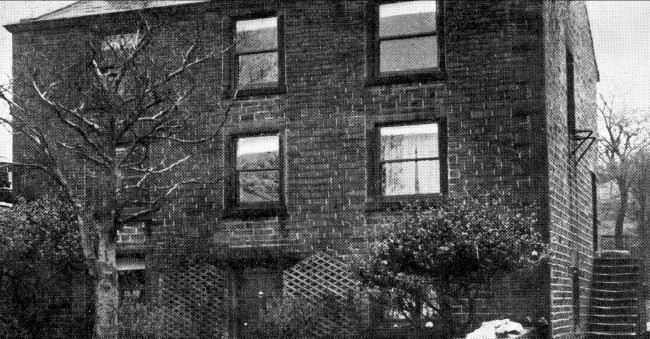
Spring Grove, our second shop
The situation arose in this way: In 1919 Grasscroft bought a plot of
land at Lydgate on which our present branch stands with the
intention of developing this area when the opportunity seemed most
suitable. As a result of a casual conversation between Grasscroft
and the Mossley managers in the sale room of the C.W.S. the Mossley
Society bought some property and immediately opened a branch. Grasscroft then proceeded to open a shop of their own.
The dispute was referred to arbitration and in September, 1929, the
arbitrators were of the opinion that Grasscroft had established
their claim to trade in this area providing they were agreeable to
take over the commitments of the Mossley Society. The latter society
did not agree with the award of the arbitrators.
The award was both fair and just. This area had always been regarded
from the earliest days as within Grasscroft’s sphere of influence. From the very commencement of the society people living at Lydgate
were enrolled as members. Indeed at two meetings of members held in
1867 the “propriety,” as it was called, of opening a branch at
Lydgate was discussed and considered. The purchase of land
immediately after the first world war in 1919 with a view to future
development is further evidence that this district was regarded as
their trading area. A purchase which was well known by Mossley at
the time.
The proper course should have been for the two societies to have met
to discuss the situation and exchange their views and intentions. This would have been in accordance both with co-operative practice
and common sense. Instead of that Mossley Society confronted
Grasscroft with a fait accompli.
Thus the absurd situation continues, and it must be said that it
reflects no credit to either side, and is quite contrary to the
principles we both, as co-operators, are supposed to represent. |
――――♦――――
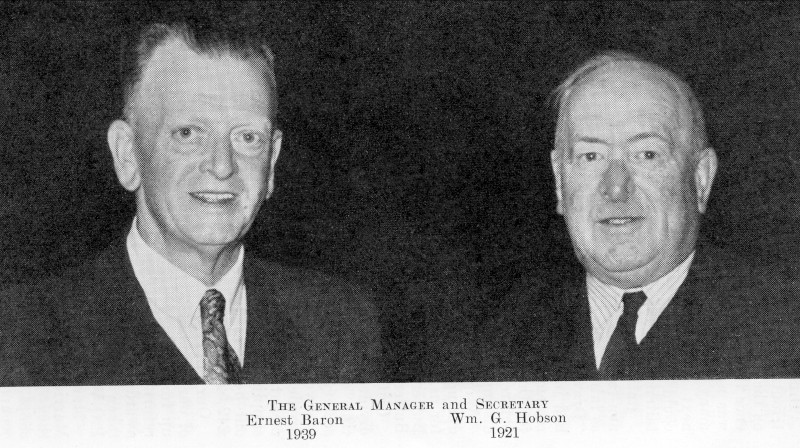
|
CHAPTER IV.
WORLD WAR II
FOR the seven
years before the outbreak of World War II the newly amalgamated
society continued to maintain its position and during this period
maintained a uniform dividend of 2/6 in the £, which in those days
was considered a very good one and was considerably more than that
paid by neighbouring societies. Sales continued to rise and the
increase in share and loan capital was extremely satisfactory. This
was one of the factors which enabled us to maintain the dividend.
The war came and immediately after its commencement Mr. Frank Lees,
the general manager, tendered his resignation of the position. He
began work with the society in October, 1894, and was appointed
general manager in succession to Mr. Dan Holden in 1910. In
recognition of his valuable and conscientious service covering a
period of 45 years the committee presented him with a gold watch.
During his period of service both the membership and the sales of
the society had more than doubled. He was succeeded by Mr. Ernest
Baron, of Golcar, who still occupies the position.
The last war brought all the stresses and strains which are now the
accompaniment of modern war. With the fall of France and the
subsequent unfortunate turn of events in the military sphere
stringent controls were introduced. Rationing of commodities, fixed
prices, and the points system. All these were operated to the best
of our ability, and it can be said that they worked fairly well.
Difficulties of course, arose especially in the distribution of
goods that were in short supply but not on the ration. Registered
customers were given preference for these goods, but in many cases
our allocation was not sufficient to cover their requirements and on
many occasions we had to hold them back until the next allocation
arrived when a fairer distribution could be made. The datum line for
allocations to retailers was the amount of purchases made in 1939.
Rationed goods were obtainable as a right but with non-rationed
goods the retailer had to do as well and as fairly as he could. We
often resorted to a system of "Drawing" for goods in short supply
and the members had just to trust to luck. Looking back one can
easily remember the queues at our shops, the people waiting for the
goods to arrive, the queue often forming up before the shops were
due to open. The queue was a distinguished feature in war time
Britain.
We can look back with pride on our achievements during the war. Prices and profit margins were fixed for us. We had no control over
the sources of supply. Butter for example was simply called
“Government Butter” irrespective of its source of origin.
Critics before the war had often asserted that the dividend was put
on the price of the goods. Wartime experience however showed that a
co-operative society could sell at the same price as its competitor
and yet return a substantial sum to the member. Our dividend never
fell below 2/1 in the £ which really meant that a member was
receiving free one week’s supplies in every ten weeks. The total
amount paid out by us as dividend during the war amounted to
£42,526.
Our chief difficulties however, arose from the staffing of our
shops. Seventeen of our employees were called up for National
Service. Fortunately they have all returned home safely. One of
them, Mr. S. Hill, was awarded the O.B.E. and another, Mr. W. Parr,
was taken prisoner at Tobruk and spent a few years as a P.O.W. in
Italy.
Many and frequent were the changes in the staff. Married women were
engaged, mostly part time, and they had had very little experience
of serving in shops. In normal times shop keeping is a skilled
occupation and requires a considerable amount of training. Not so in
war time. There was not the time, and the work was made more arduous
and complicated by the rationing system. The correct coupons had to
be cut out of the ration books and the correct price had to be
charged.
With few exceptions, the staff did their best for us and carried out
their duties satisfactorily.
Important steps have been taken to improve the conditions of
employment of our employees. In October, 1946, working hours were
reduced from 48 hours per week to 44 hours for those engaged in the
shops and for clerical workers the hours were reduced from 44 to 40
hours per week. It is also a condition of employment that all
employees should become a member of the appropriate Trades Union.
All employees are also allowed 12 days’ annual holiday with pay when
qualified and those employees with 20 years, or more service are
granted an additional three days. In operation is also an improved
scheme for the payment of wages, less personal insurance benefits,
for absence from work during sickness. Fulfilling certain
conditions, sickness pay may be paid for a continuous period of 26
weeks.
More than 30 years ago the establishment of a superannuation scheme
was considered but nothing came of it. However, we joined in 1951 a
federal scheme of the Huddersfield District and thus we are brought
into line with most other co-operative societies.
Before the World War II we bought three houses and a house and shop
in Chew Valley Road. The object of this purchase was that we could
use the shop at some future date for expansion. The opportunity came
in 1948 when the shop became vacant and we opened it as a chemist
department.
A department of this kind is usually associated with larger
societies due mainly to the high wages costs. Only qualified persons
are allowed to dispense medicines and there is a great demand for
qualified pharmacists. So far we have been extremely fortunate in
being able to obtain the services of a qualified pharmacist and we
believe our department is rendering a service to our members.
In order to keep trade within the movement members were encouraged
to make use of the inter-trading scheme which began in 1947 and
continued for nearly two years. Under this scheme members could
purchase goods from another society and pay their own society for
them. This was superseded by a more flexible and convenient scheme
known as the national membership scheme.
This, in effect, gives the member purchasing rights in every society
which has joined the scheme. No formalities are required, each
society has a code letter and all the member has to do when making a
purchase at another society is to use his own membership number plus
the code letter of his own society.
He eventually receives from his own society the dividend on the
amount of his purchase. So far we have sold under this scheme to
members of other societies goods to the value of £7,550, and our
members have purchased goods from other societies to the value of
£19,448. By this method members have the feeling of belonging to the
movement as a whole. They are members of one family.
One important post-war social reform took away from the society a
service which it had rendered to its members for nearly 40 years;
namely, National Health Insurance. When the National Insurance Act
was passed in 1911 the C.W.S. elected to become an Approved Society
under it and we became at once one of their agents.
This Act was well known because of the famous slogan “9d. for 4d.”
We had the responsibility of meeting the needs of members of the
Approved Society. We had several hundred members of both sexes when
the Approved Societies were abolished.
It is interesting to note that in 1911 a man had 4d. per week
deducted from his wages and his employer paid 3d., a combined stamp
of 7d. The benefits were, of course, very limited in scope. To-day a
man has 6/9 deducted from his wages and his employer pays 6/-, a
combined contribution of 12/9. The benefits now cover a very wide
field.
An important change in the law took place in 1952 when societies
were permitted to accept £500 instead of £200 in shares. An increase
in the amount a shareholder could hold had been advocated and
pressed for very many years. It is curious how long it takes to make
a sensible change in the law. The first Act of 1852 allowed £100 as
the maximum shareholding, it was raised to £200 by the Act of 1862.
More than 90 years were to elapse before another change was made. No
consideration seems to have been given by the powers that be to the
reduced purchasing power of the £.
Another useful and welcome change was made in 1954 when a member was
enabled to make a nomination up to the value of £200 instead of
£100. This was another example of the tardiness in recognising the
need for change and improvement. The Act of 1867 fixed the amount at
£50 and this was raised to £100 by the Act of 1883. Another 70 years
were allowed to pass before another alteration took place.
|
――――♦――――
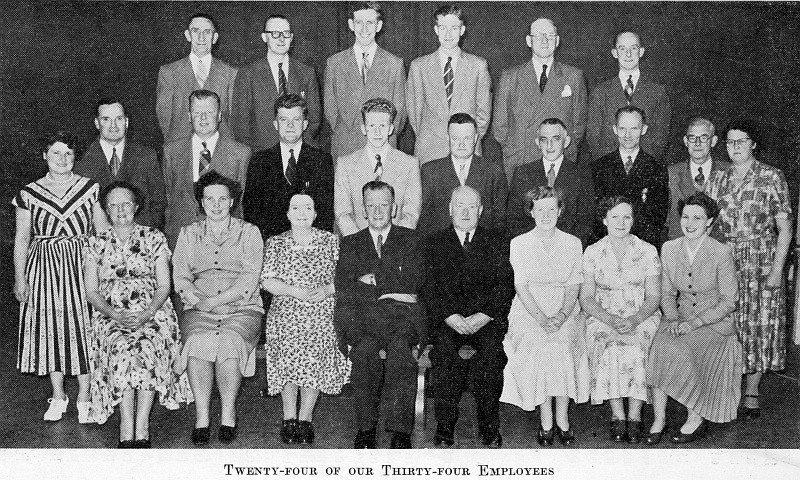
|
CHAPTER V
EDUCATION AND HOUSING
WHILE the
co-operative movement has been mainly concerned with the selling of
goods and also in producing them, other things of common concern
have engaged its attention with the object of catering for the
social needs of its members. It has devoted very large sums of money
for educational purposes, for the building of houses to let or for
sale, in lending money to members to enable them to purchase their
own houses, and in making donations and subscriptions for charitable
purposes. Our society has not been backward in any of these respects
and has a creditable record to show in all of them.
In the early years the movement took a far greater interest in
education than the State; in many parts of the country societies set
up reading rooms and had their public libraries long before the
Local Authorities thought of doing so. The writer can recall the
time when the Mossley society provided a public reading room in each
of the wards of the town and also ran a large lending library. These
have now been given up but the town is still without a public
reading room.
In 1892 our society amended its rules in order
that it might devote some of its funds for educational purposes.
It is extremely interesting to scan through the pages of the “Wheatsheaf” of 50 or
60 years ago and learn what was done on these lines. Classes were
held in the following subjects — shorthand, book-keeping, gardening
and horticulture, dressmaking, cookery, sick nursing, and science. At one period the cookery class had 150 students.
Fifty years ago the hall was very much used by the education
committee in promoting concerts, social evenings, lectures, tea
parties, and magic lantern displays. First-class artists were
engaged and distinguished lecturers appeared. These events did show
to those who were taking part in them that their social needs were
being met and satisfied. Our society had, for very many years, a
public lending library and for a short time provided a reading room
which had to be closed on account of rowdyism.
In addition, efforts were made to keep the members in touch with the
productive operations of the C.W.S. which were really of great value
in fostering and maintaining an interest in the larger aspects of
the movement. Visits to factories were arranged; Middleton Jam
Works, Crumpsall Biscuit Works, Irlam Soap Works, and Longsight
Printing Works. On some of these occasions not less than 250 persons
took part.
On another occasion, in conjunction with neighbouring societies, a
special train was engaged to take members and their families to
Bradford to visit an exhibition of co-operative productions. The
contingent from our society was more than 100 strong. These visits
must have been of considerable value to those taking part. Nearly 20
years have passed since a visit to a productive factory was made.
An excellent example of the use of funds for the common benefit of
the members was the payment of donations and subscriptions to the
various hospitals which served the district, such as Manchester,
Ashton, Oldham, and Huddersfield, also the Devonshire Hospital at
Buxton and the two C.W.S. Convalescent Homes at Roden and
Scarborough. By means of these subscriptions members in need could
obtain recommends, free or at a nominal cost. Our grants for
education amount to £2,888 and the total of our charitable donations
amount to £2,437. Not a bad record for a small society.
Before the first world war co-operators took a lively interest in
the building of houses for their members. Indeed it was regarded not
only as their duty but as one of their objects. This was provided
for in the first rules of the Rochdale Pioneers. Also in order to
enable members to own their own houses societies opened up what
afterwards became known as building departments whereby money could
be advanced to members on mortgage security.
Up to the outbreak of the war in 1914 our society was very actively
engaged in building houses, and we can look back with pride on what
was accomplished during this period as will be seen from the
following.
In 1876 a start was made with the erection of the 13 houses at
Spring Grove. Looking back, with the knowledge of the standards
which are now required, the type of house chosen was not a happy
one. Back-to-back houses would not be allowed to-day. If the
amenities were few the rents were low ranging from 3/3 to 5/1 per
week. But in spite of the lack of amenities if any one of these
houses becomes vacant there is always plenty of applicants for its
tenancy. They have never been known to stand empty for long.
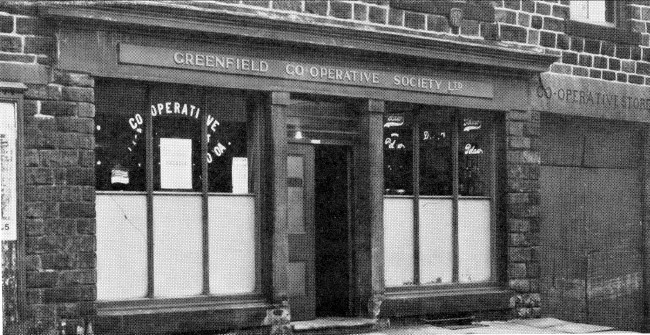
Central Premises. Erected in 1881 and soon to
be modernised
In 1888 the erection of the 13 houses at Spring Grove Terrace was
begun. Lessons had been learned from the previous experiment and
they were of a much better type and it turned out to be a much more
successful venture for all these houses were sold. In 1899/1901 10
houses were put up at Berry Street. These also showed a still
greater improvement for in eight of them a bathroom was installed. This venture was a success for they have all been sold.
The most ambitious scheme of all was commenced in 1908 when the site
on which the Garden Suburb houses now stand was purchased for
£1,000. Forty-six houses of various types were erected and the
total cost to the society was in the region of £20,000. Unlike the
previous efforts these houses were built of brick instead of stone. The rents fixed were comparatively low even in those times, varying
from 4/4 to 7/4 per week.
This scheme was at first a great strain on the financial resources
of the society and for a time it had to work on a bank overdraft. If
the object of building these houses was to sell them to the members
it was not a success, for to-day more than 40 years afterwards, we
still own 19 of them.
For many years after their completion in 1912 the society suffered
very heavy losses at each accounting period. This was partly due to
the rising costs of maintenance and partly to the fact that the
society as owners of the houses had to pay income tax on them at the
full standard rate. So serious were these losses that the committee
decided in 1922 to offer to each tenant the house they occupied at
cost price, but very few unfortunately, decided to accept this
generous offer.
No more houses were built by the society, nor is it ever likely that
any more will be built by us. House building at the present time is
out of the range and the competence of a co-operative society. It is
a job which can only be undertaken successfully by Local Authorities
with the help of government subsidies. Only a very small proportion
of the houses now being built is being done by the private builder.
It is indeed very remarkable that a small society like ours should
have been able to build 87 houses. The first batch was erected when
the society had only 400 members and its capital was only about
£5,000. The last batch of 40 houses was erected when the membership
numbered only 726 and the capital available was only £21,000. Obviously in those days both the committee and the members had
unlimited confidence in the future and the durability of the
society.
For more than 60 years the society has always been willing to be of
assistance to those members who desired to own their own houses. The
first mortgage advance appears to have been made about 1892. Since
then the sum of £74,289 has been advanced on mortgage security. The
two world wars did not interrupt this valuable service, indeed they
stimulated it. Since the end of the World War II we have advanced to
members the sum of £18,240. It is remarkable to note that in 64
years the society has only had to take possession in one case.
It is questionable whether this service can any longer be continued
in view of the high price of houses. We have not the capital
available nor is it desirable in times like these to invest money
for periods up to 15 or 20 years. This service can be much better
rendered by the special organisations like the building societies
which have been established for this very purpose. Nevertheless this
does not diminish the splendid services which this society has
rendered to its members in the past.
It may be appropriate at this point to mention the position of women
in the co-operative movement. Throughout its long history the
movement has always treated men and women alike. Membership has
always been open to both sexes on equal terms.
Many societies in the early days had a rule permitting only one
member of a family, either husband or wife, to become a member. Usually under this rule the husband took advantage of this, but
there was no sex discrimination in the movement either by rule or
practice.
It is interesting to note that this society, according to the minute
book, admitted Ann Bowker as a member in April, 1857, that is,
within two months of opening the first shop. The society has also
had the distinction of having a woman as a member of the committee. Mrs. Edith Thomas served on the committee for a period of 12 years. Prior to coming to Greenfield she had the honour of being the first
woman to serve on the committee of the Stockport Society.
The Co-operative Women’s Guild was formed in 1883 and still plays an
important part in many co-operative societies. The names of many
distinguished women engaged in co-operative and social service
appear on the lists of presidents and secretaries of the Guild. Two
efforts have been made to form a Guild in Greenfield but one has to
admit that it did not meet with the success it deserved.
A great change is taking place in the membership of co-operative
societies. Formerly the majority of the members were men, but in
recent years, as far as Greenfield is concerned, the number of women
admitted to membership exceeds that of men. No one can exactly say
what this change portends. Is it one of the reasons why there is so
much apathy among the members? That so few are sufficiently
interested in the affairs of their society or in attending the
business meetings? |
――――♦――――
|
CHAPTER VI
THE STORY OF GRASSCROFT
ANY account of the Greenfield Society would be incomplete if no
reference was made to the Grasscroft Society, which is now part of
Greenfield Society. For just over 75 years the Grasscroft Society
served the interests and provided for the needs of its members quite
as efficiently as any other society. In our possession we have all
the minute books of this society from its commencement until its
end, and the writer has scanned through these minute books with
considerable interest and pleasure.
The first meeting in connection with this society was held on August
17th, 1858, when the following account of its proceedings was made:
“At a meeting held at the house of Eli Fielding in Grasscroft the
following resolutions were agreed upon.
(1) That Eli Fielding, John Jessop, Benjamin Whitehead, Benjamin
Buckley, John Shaw, Joseph Dawson, William Hawksworth, John Shaw
junior, James Winterbottom, Samuel Farrand, Samuel Pilling form
themselves into a committee or board of directors until a
co-operative society is established in Grasscroft to be governed by
laws and rules somewhat the same as the co-operative society, Lees.
(2) That Joseph Dawson serve as president, William Hawksworth,
secretary, and Benjamin Buckley, treasurer.
(3) That we purchase one small memorandum book value sixpence.
(4) That Eli Fielding and Benjamin Buckley intercede with Master
Thomas Wrigley of Lydgate about the house last occupied by
Jackson’s. In earnest of the above objects we, Benjamin
Buckley, Eli Fielding, John Shaw, senior, and John Jessop deposit £1
each to treasurer.”
At the next meeting a few days later three more came forward and
deposited together the sum of £5. 2s. This along with the £4
previously subscribed provided a capital of only £9. 2s. With this
small sum and the 6d. memorandum book above-mentioned, the society
started its long career of usefulness and service.
The first purchases were authorised on September 21st and consisted
of 1 Tierce of No, 1 Crystals; 1 Puncheon Syrup; 1 box of Valentias;
1 cwt. of rice and 1 cwt. of currants; all from a firm in Liverpool.
It was now necessary to lay down “The Rules of Attendance of
Directors.” Their office was to be no sinecure. They were to meet at
7-30 p.m. every Monday evening in the society’s upper room at Grasscroft. No fees were allowed, but if they were late they would
be fined one penny, if they were absent without proper apology the
fine was two-pence. In 1861 it was decided that they would receive a
fee of 2d. each night “for their labour.” But the fines remained. In
1897 the fees were increased from 6d. to 1/-.
It was decided “to begin and end” on the last Monday in every third
month commencing September 27th, 1858, and the first quarterly
meeting was held on December 30th, 1858, when a dividend of 2s, in
the £ was declared, a remarkable achievement. No attempt was made
for very many years to maintain a uniform rate of dividend. What
profit there was determined the rate. It rose or fell each quarter;
sometimes it fell to 1/4; in 1862 it was 2/4; in 1872 it was 2/6;
and in 1877 it rose to 3/-.
The amount a member might hold in shares was frequently changed, and
it seemed to depend on the amount of capital the society had
available at the time. In 1861 the figure was fixed at £50, then
reduced to £20 in 1863; in 1865 it was raised to £100, reduced again
in 1883 to £80 and then in 1894 to £50. A member was expected to
purchase from the stores, for on one occasion a member who had £50
in his share account was discovered to make no purchases. The
secretary was instructed to write to him and tell him he must either
make purchases or receive no interest on his shares.
After seven years the results must have been so satisfactory as to
justify the members in deciding in 1865 that the time had now
arrived when they should build their own shop or premises. It was
resolved that a new store at the bottom of Carwell Meadow (now
Mossley Road Branch) be built together with two cottages and a large
room over the store. Each member was asked to send word to the
secretary within four weeks what amount he could find in shares over
his present amount.
The opening of the new Co-operative Hall took place on December
15th, 1866, and the following report was made for the occasion on
the progress of the society to date. It is given in full and it is
written without any alteration in the spelling. It is extremely
interesting to read.
“The Society we are met here to represent is cald the Grasscroft
Co-operative Society, this Society was born on the 23rd of
September, 1858 there, ad enrolled themsels as members with a
capital of £118. So they had a good beging both in the number of
members and capetal you will see from the above date that the
society has lived over 8 Years and i may here remark that all that
time it as had very good health, they did not start in ignarance as
to the benefits of cooperation for they had most of them been
members of a cooperative society at Lees, about 2½ miles distant
over the hill and some of them had served on the board of manighment
so they partley new how to go about their buisness they carred
groceries and provisions all that distance to soport ther families
so we may call them cooperators to the back bone. Our trade for the
first year was to the amount of £1,351, realising a net profet £107. Our trade for the year ending September, 1866, is £5,136 with a net profet £589. Our receipts during the 8 years have been £24791 yealding a net profet of £2564 which has been distributed as folows
| Interest |
£254 |
| Dividend or Bonus on purchases |
£2186 |
| Reserved Fund |
£85 |
| Fixed Stock |
£39 |
| |
£2564 |
Now if these profits had been divided on capital only they would have
been equal to 55 per cent per annum. Our present No. of members is
200 and our Share capital amounts to £1930 of that amount we have
invested in this Building £1000 and in other co-operative Societies
£200 so it leaves us about £800 to work the trade of the Society
with so members will see that the money they have invested is not
idle it has to be turned over about 6½ times in 12 months. Our rules
are so framed that the poorist may become members for by paying 1/-
as entrance fee they are entitled to all the benefits of the society
but they are expected to contribute 3/3 per quarter or one half
penny per day Sunday excepted until they have got £1 in the funds of
the Society for which they will receive interest at 5 per cent per
annum.”
The writer of this report, whoever he may have been, had evidently
seen a great light. He was a “co-operator to the back bone” and a
fervent believer in the principles and the practice of co-operation. To him it was not just a matter of shop-keeping, but was looked upon
as an instrument of social change whereby the lives of ordinary men
and women could be improved and their standard of life raised to a
higher level. He had a faith to live by and he was full of hope and
confidence in the future. If only a tithe of the members of
co-operative societies in this generation had the same enthusiasm
what a different movement it would be.
He was not the only one in Grasscroft with this belief and
confidence in the future of their small society, for immediately
after the completion of the store they started looking round for
further extension to their business.
At two general meetings in 1867 they considered the propriety, as
they called it, of opening up a branch at Lydgate. At neither
meeting was a decision arrived at and no further reference seems to
have been made concerning it. It is painful to recall that more than
60 years were to pass before they opened a branch at Lydgate, under
circumstances much more unfavourable and unpleasant and which
brought them in conflict with a neighbouring society. The cordial
and friendly relations which had prevailed between these two
societies for so many years were severed and embittered.
How different was a similar situation handled in 1887 when
Grasscroft proposed to open a branch at Shadows Lane. It is pleasant
to read the wise and gracious letters which were exchanged between
the two societies at that time. They both referred to the cordial
relations which had prevailed for so long and they both expressed
the hope that such relations would continue. In 1887 both societies
thought first and then acted afterwards; in 1929 they acted first
and thought about it afterwards. In 1887 Grasscroft willingly
dropped the proposal to trespass on another society’s territory.
In 1876 it was decided to enter the butchering business. At a
special general meeting held on February 22nd it was resolved “to
take premises newly built by Joel Byram if they can and if they
cannot take these premises that they do as well as they can and they
would have a stall near the stores.” A few days later it was decided
to take the said premises from Joel Byram at a rent of 9/11 per
week. They advertised for a butcher and if he were a married man he
could have gas and rent free. Mr. John Bottomley was appointed and
he began the business by buying one cow and three sheep. A separate
dividend of 1/9 in the £ was paid.
In 1877 it was decided to buy land adjoining their store and to
build upon it four cottages, a stable, and a cart shed.
The question of building a shop at Shaw Hall Bank Road seems to have
been the subject of discussion spread over many years with
fluctuating fortunes. In 1889 several special meetings were held to
discuss the question. The first meeting held in August approved in
principle. At the second one held in November a resolution to build
a shop was carried by a majority of three, and a building committee
was actually formed to carry it into effect. A third meeting was
called in December and it was resolved not to build. Seventy-four
members attended this meeting; 39 voted against building and 35 in
favour.
At the general meeting in January, 1881, the board seems to have
been congratulated on buying the five houses at Shaw Hall Bank and
it was resolved to open a branch shop in their new houses.
In 1887 the members left the question of entering the coal business
to the committee and this was commenced this year. It was decided to
pay the same dividend on coal as on groceries.
At this time the building of a shop at Shaw Hall Bank was again
revived, and at a special meeting held in August it was decided to
build a grocery, drapery, and butcher’s shop; 26 voted for and 21
against the proposal. At the next meeting in October it was decided
to postpone the question for six months. At the April meeting in
1888 it was decided not to do anything for the present.
Ten years later it was decided to call a special meeting, which was
held on August 31st, 1898, and it was then decided to build a
butcher’s shop, grocer’s shop, slaughter house and cottage. The work
was proceeded with this time, for in October the following year it
was decided to have a tea party on its completion but no
committeeman or assistant was to have a free ticket.
The building was a large one and consisted of grocery, butchery,
drapery, office, and boardroom. At the time its size was out of all
proportion to the trade, and for any trade in the foreseeable
future. More than half the building is now derelict, and the
grocer’s shop, which is the only one now in use, is large enough to
cope with a trade six times its present amount.
With the completion of this building further developments in
Grasscroft came to an end with the exception of the opening of a
small shop at Lydgate, modernising the original shop at Grasscroft,
and building two capacious garages at Shaw Hall Bank, capable of
holding a fleet of motor vehicles, but now used for storing coal.
In 1933 the amalgamation with the Greenfield Society took place. So
far as the minute book is concerned nothing whatever is recorded
about the proposal. It is recorded that in October a deputation from
the Co-operative Union Ltd, came to interview the board to discuss
the workings of the society for the past six months. What the result
of this interview was is not mentioned.
The auditor came to the general meeting in October and assured the
members of the financial soundness of the society and said if the
members would increase their purchases a return to the normal rate
of dividend could be made. So far as the minute book is concerned
there is nothing to indicate that amalgamation had been discussed,
nor is there any reference to the fact that meetings had been held
with the Greenfield Society.
The first special meeting was held on November 28th, when 80 members
were present; 69 voted for amalgamation and 11 against. The second
special meeting was held on December 14th to confirm the previous
resolution. Forty-five members were present; 43 voted for, one
against, and one did not record a vote. The last meeting of the
committee was held later the same evening.
Thus Grasscroft Society as an independent Society came to an end
after 75 years of useful service to its members. We ought to pay
tribute and respect to all those persons who in the course of those
75 years gave the society their support and service. It played an
important part in the lives of its members, not only in supplying
their needs as consumers but also in their social life as well. |
――――♦――――
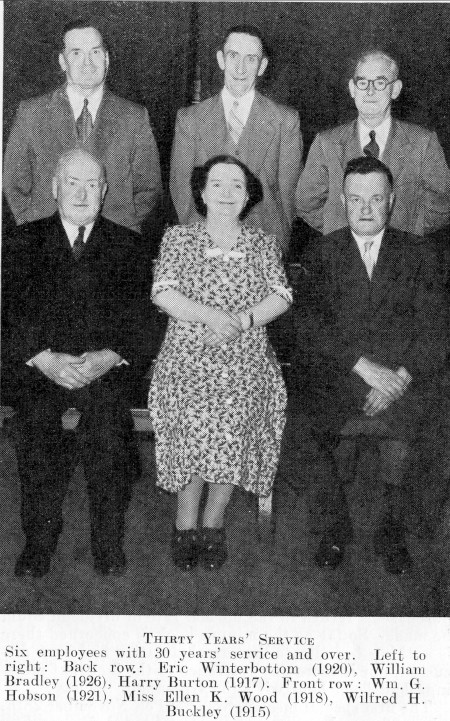
|
CHAPTER VII
A COMPARISON
IT may be worth while to compare the position our Society in 1956
with that of 1906 when the Jubilee was celebrated. Let us look at
the figures. The figures for 1906 include those of the Grasscroft
Society.
|
|
1906 |
1956 |
|
Membership |
940 |
1,856 |
|
Sales |
£30,679 |
£119,298 |
|
Share Capital |
£20,168 |
£80,l07 |
|
No. of Grocery shops |
3 |
6 |
|
No. of Employees |
19 |
35 |
|
Wages paid |
£1,252 |
£14,l62 |
|
Average dividend |
3/- |
1/- |
These figures do not show any spectacular progress. It should, of
course, be remembered that we are still a village society — and are
likely to remain so, operating in a village which does not show any
substantial increase in population. To-day, as it was 50 years ago,
our trade consists mainly of the sale of foodstuffs. The population
of our area is not large enough, nor have we sufficient members or
capital resources which would justify the opening of new non-food
departments.
Many factors militate against the development of trade in the dry
goods departments of a small society. Modern transport, both private
and public, has brought the neighbouring towns within easy reach. The changed spending habits of the people, the family income is much
larger than ever before, but the proportion of this income spent on
food is much smaller. As a result of this a good margin of the
family income is available to be spent on other things than food. One has only to think of the money now spent on such things as
motoring, radio, television, holidays, entertainment, sport and even
on gambling.
People are much better dressed than they were 50 years ago and they
are more fastidious in the choice of the clothes they wear. They
flock to the towns, where a greater choice is offered by the popular
emporia. In order to keep this trade in the movement arrangements
are in operation whereby members may purchase their
supplies at the larger societies just as if they were members of
those societies. This system is called the National Membership
Scheme which could — and should
— be more fully made use of.
It is the opinion of many leading co-operators that the day of the
small society is over. The small society will not be able in the
near future to meet the modern methods of competitive trading. They
have not the resources or the initiative to modernise their shops
and adopt up-to-date methods of retailing. Nor can they offer their
members more than a limited range of services. There is much force
in all these arguments, and they will probably be reinforced by the
report of the Independent Committee of Inquiry when that is
published.
However that may be, we believe that the Greenfield Society has been
of inestimable value to its members during the past century both
socially and economically and in spite of the revolution in the
methods of modern retailing, there is no reason why for many years
to come it should not be of the same service. The society enjoys the
confidence of its members, it is financially sound, and is quite
capable of supplying the basic needs of its members quite as well as
any other retailer. Further, the surplus of our operations continues
to be returned to the members in proportion to their purchases.
Let us now glance at the retail movement as a whole.
|
|
1906 |
1955 |
|
No. of Societies |
15,916 |
964 |
|
No. of Members |
2¼ millions |
112 millions |
|
Sales |
£98
millions |
£842 millions |
|
No. of Employees |
108,415 |
280,109 |
These figures show the astonishing progress which has been made
during the past half century. One society has now more than one
million members, and 11 societies have more than 100,000 members
each. Our share in the above figures is, of course, infinitesimal,
but we are nevertheless proud to belong to an organisation which can
show such results.
The retail co-operative movement is the greatest organisation of its
kind in the world, the greatest chain store in the world, possessing
more than 27,000 fixed shops of which number more than 20,000 are
food shops. The co-operative movement, through its huge federal
societies, deals with a greater variety of goods and services than
any other organisation, including banking and insurance.
Its defects, shortcomings and weaknesses are many and manifest and
are frequently the subject of discussion at conferences and meetings
both of boards of management and officials. So much alive are we to
these matters a special independent committee of inquiry has been
set up to examine and report on every aspect of the movement. The
results of this inquiry should be extremely valuable.
It would be both foolish and unwise to speculate on the future. Modern Governments are more powerful than ever before, and they are
taking a much greater interest in the social and economic life of
the people they govern. The results of scientific investigation and
the use to which they are put is overwhelming and awe-inspiring. If
unwisely used they may easily lead to our annihilation, but if
wisely used they could inaugurate an era of happiness and comfort
for mankind beyond our wildest dreams,
The alternatives before us are that we must die together or live
together, and the only way we can live together is by co-operating
one with another and rendering each other mutual aid. “All for
each and each for all.” |
――――♦――――
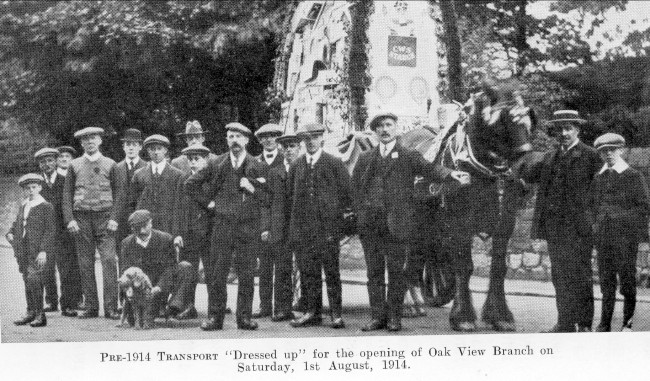
CHAPTER VIII
LOOKING BACK
FROM THE OLD
MINUTE
BOOKS OF
GREENFIELDS
|
| 1857 — |
That Trust Tobacco be sold at 3d. per oz. |
| |
James Wrigley & Jonathan Winterbottom |
| |
sleep in the store. |
| |
The Tobacco be sold for what it will fetch, |
| |
the salesman to do what he can for the store. |
| |
The hours of opening and closing the store |
| |
be as follows, that it is opened at 9 OC in |
| |
the morning to 2 Oc at noon and from 3 OC |
| |
in the afternoon til 9 OC in the evening |
| |
except on Saturdays till 11 Oc at night. |
| |
The best Twill Sheets be sold at 3/6 per couple. |
| |
The coals be sold at 5½d. per cwt at the
store. |
| |
|
| 1858 — |
A majority of 17 to 2 are for the store to be |
| |
carried on as usual—14 neutral. |
| |
|
| 1859 — |
We send for 6 firkins of butter to Tiperary. |
| |
|
| 1860 — |
We send for 20,000 cups to Birmingham. |
| |
The shop be closed every Tuesday at 2 OC |
| |
beginning Aug 6th 1860. |
| |
|
| 1862 — |
As many as can make it convenient to remove |
| |
the goods from the old shop to the |
| |
new shop to be here at 2 OC on Tuesday |
| |
next the 6th day of May 1862. |
| |
The shopman buys a New Coffee Mill if he |
| |
can please himself. |
| |
The members of the committee receive 3d |
| |
per week for their services if in time. |
| |
|
| 1863 — |
The Balance Sheet pass just as it is. |
| |
The shop is open at 7 OC in the morning. |
| |
We take up 140 Shares in the North of Eng- |
| |
land Cooperative Wholesale Industrial & |
| |
Provident Society Limited (now CWS). |
| |
|
| 1864 — |
A well be sunk in the back yard. |
| |
|
| 1867 — |
We buy no more gunpowder or blasting |
| |
powder after this time. |
| |
That Thos Bradbury & Wm Buckley endeavour |
| |
to buy the Ass of John Winterbottom or |
| |
its owner at Fern Lea. |
| |
Jas Hirst receive the sum of 1/9 per week |
| |
for the keep of the Donkey, winter & summer. |
| |
|
| 1868 — |
Any committeeman not being at his post at |
| |
8 OC be fined 2d for each offence. |
| |
|
| 1869 — |
The donkey be sold for 25/-. |
| |
|
| 1870 — |
G. F. Ramsden has a Fish Stall in, under |
| |
the arch, at the Co-operative Building |
| |
during the winter season. |
| |
|
| 1876 — |
The Stores be closed on Tuesdays at 12 OC |
| |
to commence 18 April 1876. |
| |
We open a Banking Account with the Co- |
| |
operative Wholesale Society Ltd Balloon |
| |
Street Manchester |
| |
|
| 1879 — |
—— be expelled from the Society for |
| |
a misdemeanour. |
| |
|
| 1882 — |
The Oddfellows of Welcome Return Lodge |
| |
have use of the Reading Room for their |
| |
meetings for the sum of £2 per year, Gas |
| |
and fire to be included in this sum. |
| |
|
| 1883 — |
We be members of the Oldham District |
| |
Conference Association. |
| |
No Bakery be established in connection |
| |
with our Society. |
| |
No dogs be admitted in the shop. |
| |
|
| 1884 — |
The Book Check System be adopted to commence |
| |
the 28 March 1885. |
| |
|
| 1886 — |
All employees of this society receive one |
| |
week’s wage when sick, if sickness continues |
| |
for any further time than one week |
| |
no wage allowed after first week, until |
| |
commencing work again. |
| |
Voting in future be done by centumgraph |
| |
stamped papers at election of Committee. |
| |
|
| 1888 — |
All employees be allowed two days holidays |
| |
per annum the above in addition to the |
| |
usual holidays when stores are closed. |
| |
The half sovereign found by the secretary |
| |
in the old box upstairs be expended on |
| |
stamps for society’s use. |
| |
|
| 1889 — |
That there be iron ties uniting the feet of the |
| |
roof in the Hall. |
| |
|
| 1892 — |
The question of subscribing to the Public |
| |
Bath’s Fund be postponed indefinitely. |
| |
|
| 1896 — |
The petition in favour of Pure Beer be |
| |
signed & forwarded to County Member. |
| |
We give the sum of £5 towards the erection |
| |
of a bridge over the river at Andrew Mill. |
| |
We subscribe the sum of £5 to the Public |
| |
Bath’s Fund. |
| |
|
| 1897 — |
In future all employees of this society have |
| |
one week’s holiday granted them per |
| |
annum in addition to usual stopages. |
――――♦――――
FROM THE OLD MINUTE
BOOKS OF
GRASSCROFT SOCIETY
[Ed.― the spelling is at it appears]
|
1858— |
That we purchase one small memorandum book |
|
|
value sixpence. |
|
|
Eli Fielding and Benjamin Buckley interceed |
|
|
with Master Thomas Wrigley of Lydgate |
|
|
about house last occupied by Jackson’s. |
|
|
The Directors meet at
½ past 7 oclock with |
|
|
a fine of one penny if too late and twopence |
|
|
for non-attendance. |
|
|
We begin and end on the last Monday in |
|
|
every third month commencing September |
|
|
27th, 1858. |
|
|
We purchase two jackets and aprons each |
|
|
for the shopmen. |
|
|
John Mills purchase one pig at 55d. per lb. |
|
|
Accounts be passed as corrected this |
|
|
quarter. |
| |
|
|
1859— |
Benjamin Buckley attends a sale at Greenfield |
|
|
to purchase Weights and Weighs, |
|
|
large and small, if he can get them cheap. |
|
|
A Committee of 5 Directors to read and |
|
|
make Laws to govern the Society. |
| |
|
|
1860— |
We try two new shopmen for the next Quarter. |
|
|
We have gas fitted up in the shop. |
|
|
That we give the present shopmen notice given |
|
|
to them for to leave off as the shopmen of |
|
|
the store on Saturday next. |
|
|
We give to the letter carriers 3/- as a gift. |
| |
|
|
1861— |
The Committee shall henceforth be paid the |
|
|
sum of two-pence per night for their labour, |
|
|
that in case they are not here when their |
|
|
names are called they shall be lined 2d, |
|
|
except a sufficient apology be given according |
|
|
to Rule. |
|
|
We have a tea party on Saturday April |
|
|
16th, 6d each admission, after tea 3d. |
|
|
The Trustees shall be paid the same wage |
|
|
as a Committeeman but not be fined if |
|
|
absent. |
| |
|
|
1863— |
The shop shall be closed tomorrow the 10th |
|
|
instant for the Prince of Wales’ marriage |
|
|
celebrations. |
|
|
We order a seal with the words ‘Grasscroft |
|
|
Industrial Cooperative Society Ltd.’ |
|
|
We sell butter at 11d. per lb. |
| |
|
|
1864— |
Each Auditor has 2/6 each. |
| |
|
|
1865— |
Whe build a new store at the bottom of Carwell |
|
|
Meadow together with 2 cottages, that |
|
|
we have a large room over the store, that |
|
|
each member send our secretary word |
|
|
within 4 weeks what amount he find in |
|
|
Sheares over is present account. |
|
|
We open an account with the Saddleworth |
|
|
Banking Company. |
|
|
Our Share Capital be limited to £100 each |
|
|
member. |
|
|
This store be opened on Tuesdays at
½ past |
|
|
7 oclock in the morning and closed at |
|
|
2 oclock for the day. |
| |
|
|
1866— |
We become members of the North of England |
|
|
Wholesale Society and that we |
|
|
deposit £37 10 0 in the Society. |
|
|
We buy a safe. |
|
|
Our shop lad has 10d per week from now |
|
|
and that he stops in the shop every night |
|
|
in the week until it closes. |
|
|
John Jessop goes to Meltham Mills to see |
|
|
a gass apratos. |
|
|
That they let the large room as often and for as |
|
|
much as they can per night until the next |
|
|
Quarterly meeting but on no one night for |
|
|
less than 2/6. |
| |
|
|
1871— |
Laws to be observed in lending the hand |
|
|
cart. |
|
|
It be lent out to members or non-members |
|
|
for any purpose at 3 pence per hour but to |
|
|
pay all breakage or damage done to the |
|
|
hand cart. |
|
|
The stores closes at half past one oclock on |
|
|
Tuesdays and at 6 oclock on Saturdays. |
| |
|
|
1877— |
Our horse and cart carries out goods to our |
|
|
members on Fryday after noon and Satderday |
|
|
fore noon. |
| |
|
|
1880— |
We do not entertain the idea of building a |
|
|
Branch Store at Roches as we consider it |
|
|
out of our locality. |
| |
|
|
1881— |
A Bank Account be opened with the Wholesale |
|
|
Society the Committee send a deputation |
|
|
to the neighbouring stores to discuss |
|
|
the advisability of reducing Share Capital. |
|
|
We put a Bill in shop that subscriptions will |
|
|
be received towards a purse of gold for our |
|
|
late secretary. |
| |
|
|
1888— |
We have a new barrow at Butchering |
|
|
Department for the use of members for |
|
|
housing their coals and if it is used for |
|
|
other purposes a charge of 2d will be |
| |
|
|
|
charged for each journey. |
|
1891— |
We charge 4/- per day for our horse going |
|
|
to Dintin with the ringers. |
――――♦――――
IMPORTANT DATES IN THE
HISTORY OF
THE SOCIETY
|
1852 |
First Industrial & Provident Societies Act Share |
|
|
Holding £100. |
|
1856 |
Greenfield Industrial & Benevolent Co-operative |
|
|
Society Ltd. Established. |
|
1857 |
Greenfield Industrial & Benevolent Co-operative |
|
|
Society Ltd. Registered. |
|
|
First Shop at Piccadilly Opened. Rent 3/6 per |
|
|
week. |
|
1858 |
The Grasscroft Co-operative Society Ltd. |
|
|
established. |
|
1859 |
Second Shop opened at Spring Grove. |
|
1860 |
Tuesday Half-Day Holiday commenced. |
|
|
New Industrial & Provident Societies Act. Share |
|
|
Holding £200. |
|
|
Present Central Grocery Premises Opened. |
|
1863 |
North of England Co-operative Wholesale Society |
|
|
Ltd. Established. Later C.W.S. |
|
1864 |
No. of Committeemen reduced from 9 to 8. |
|
|
New Rules. |
|
1866 |
Butchering Department opened. |
|
1868 |
Coal Department opened. |
|
1873 |
New Rules. |
|
|
Penny Bank Department opened. |
|
|
Name changed to The Greenfield Co-operative |
|
|
Society Ltd. |
|
1876 |
New Industrial & Provident Societies Act. |
|
|
13 Cottages at Spring Grove built. |
|
1878 |
Account opened with the C.W.S. Bank. |
|
|
Drapery, Butchering, Hall and Reading Room. |
|
|
(Reading Room closed in 1882). |
|
1883 |
Nomination Act. Limited to £100. |
|
1885 |
Book Check System adopted. |
|
1888-92 |
12 Cottages at Spring Grove Terrace, built. |
|
1889 |
The Co-operative Union Ltd. registered. |
|
1892 |
Loan Department opened. |
|
1893 |
Industrial & Provident Societies Acts co11solidated. |
|
1897 |
3 Houses at Brookfield Terrace purchased. |
|
1899-1901 |
16 Houses at Berry Street built. |
|
1904 |
Rules amended to allow members to hold £200 |
|
|
in Shares. |
|
1906 |
Society’s Jubilee Celebrated. 21 July. |
|
1908-12 |
46 Houses in Garden Suburb built. |
|
1909 |
Collective Life Assurance Scheme adopted. |
|
1911 |
2 Houses at Andrew Mill purchased. |
|
1913 |
Industrial & Provident Societies Act. Public |
|
|
Auditors Compulsory. |
|
1914 |
Oak View Grocery Opened. |
|
1916 |
Model Rules adopted with own amendments. |
|
1918 |
Fish & Fruit Department opened. Enlarged 1924. |
|
1920 |
Frenches Branch opened. |
|
1921 |
Milk Department opened. |
|
|
Climax Check System adopted. |
|
|
Butcher’s Shop in Wooden Hut at Oak View |
|
|
opened (closed in 1924). |
|
1922 |
First Half-Year1y Balance Sheet published. |
|
1925 |
Bakery and Confectionery Departments opened. |
|
1933 |
Amalgamation of Grasscroft and Greenheld Co- |
|
|
operative Societies. |
|
1936 |
6 Houses at Armit Road purchased. |
|
1937 |
4 Houses with shop in Chew Valley Road pur- |
|
|
chased. |
|
|
Butcher’s Shop at Grasscroft closed. |
|
1938 |
New Shop at Iiydgate erected. |
|
1941 |
Shaw Hall Bank Drapery Department closed. |
|
1948 |
Chemist Shop Opened on Chew Valley Road. |
|
1951 |
Employees’ Superannuation Scheme began. |
|
1952 |
New Industrial & Provident Societies Act. |
|
|
Shareholding £500. |
|
1954 |
Milk Delivery transferred to the United Co- |
|
|
operative Dairies Ltd. |
|
|
New Industrial & Provident Societies Act. |
|
|
Nomination Limit £200. |
――――♦――――
CHAIRMEN AND PRESIDENTS
|
Jonathon Hirst |
1857 |
|
James Bottomley |
1857 |
|
Joseph Wood |
1858 |
|
Char1es Bradbury |
1860 |
|
James Walker |
1862 |
|
John Bradbury Lees |
1862 |
|
William Robinson |
1862 |
|
William Buckley |
1863 |
|
,,
,, 2nd term |
1870 |
|
Isaac Smith |
1863 |
|
Edwin Lawton |
1864 |
|
James Byram |
1864 |
|
,, ,,
2nd term |
1877 |
|
Absolam Matthews |
1867 |
|
N. A. Booth |
1867 |
|
Thomas Bradbury |
1868 |
|
,,
,, 2nd term |
1875 |
|
Ralph Hawkyard |
1870 |
|
Charles Bottomley |
1870 |
|
George Butterworth |
1872 |
|
William Lees |
1883 |
|
John Thomas Bradbury |
1887 |
|
James E. Shaw |
1908 |
|
George Booth |
1911 |
|
Henry Hudson |
1920 |
|
Thomas Potter |
1925 |
|
Amos Wood |
1933 |
|
Harry Hanson |
1941 |
|
Amos Wood 2nd term |
1946 |
|
Sidney Smith |
1952 |
――――♦――――
SECRETARIES
|
Joseph Wood and Thomas Platt |
1856-65 |
|
Josiah Hobson |
1866 |
|
James Schofield (one month) |
1870 |
|
Jonathon Winterbottom |
1870 |
|
N. A. Booth |
1879 |
|
David Lawton* |
1887 |
|
Phillip Robinson |
1918 |
|
William Gilbert Hobson |
1921 |
|
*First full-time Secretary. |
――――♦――――
SALESMEN AND MANAGERS
|
Joseph Hall |
1857-58 |
|
James Bottomley |
,, |
|
Samuel Wild |
,, |
|
James Schofield |
1858 |
|
Dan Holden* |
1872 |
|
Frank Lees |
1910 |
|
Ernest Baron |
1939 |
|
*First General Manager. |
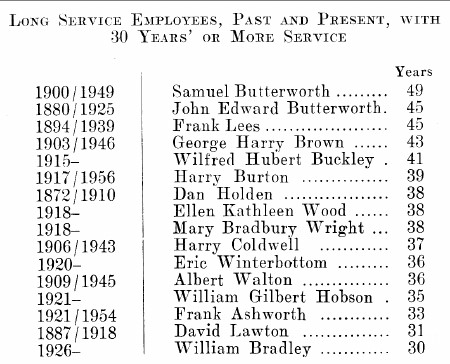
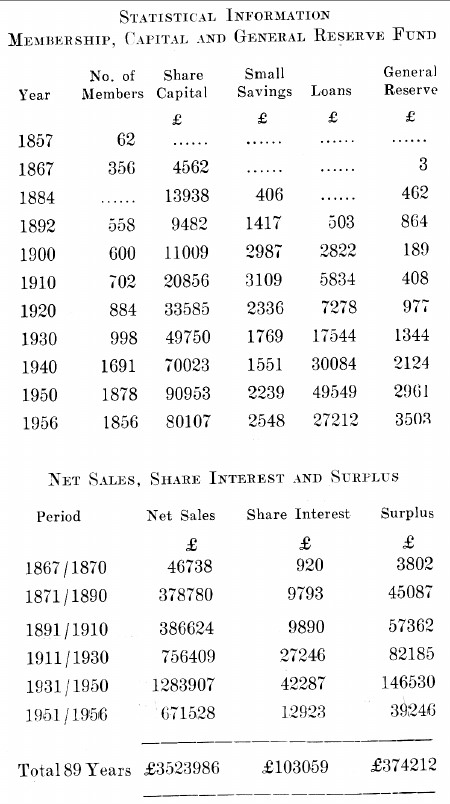
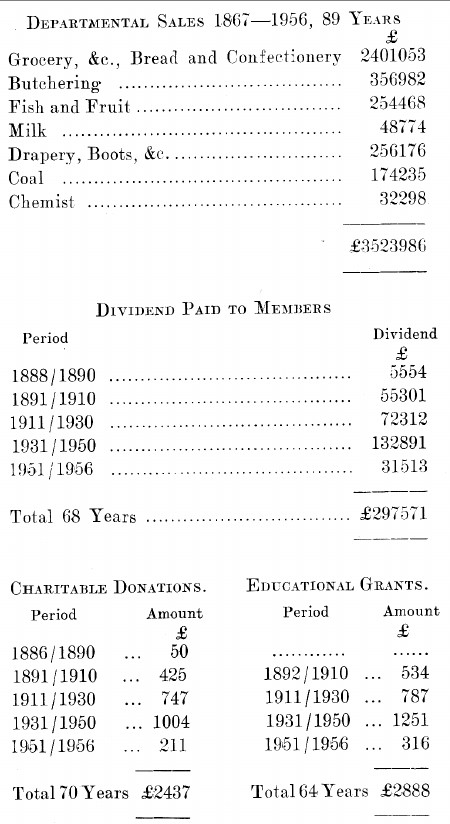
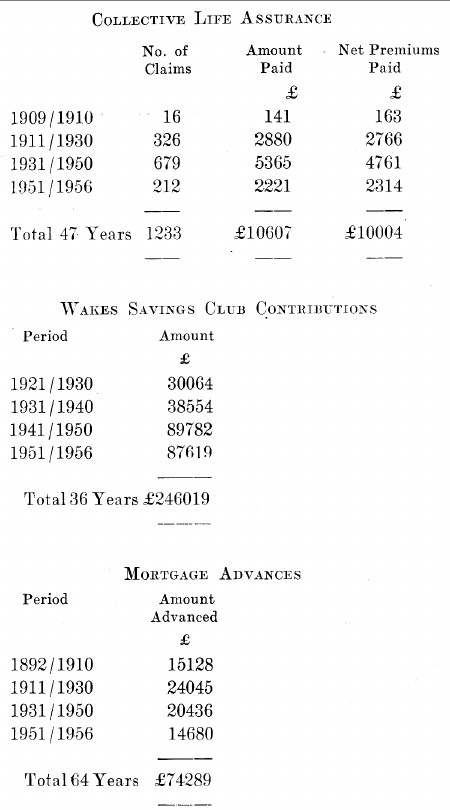
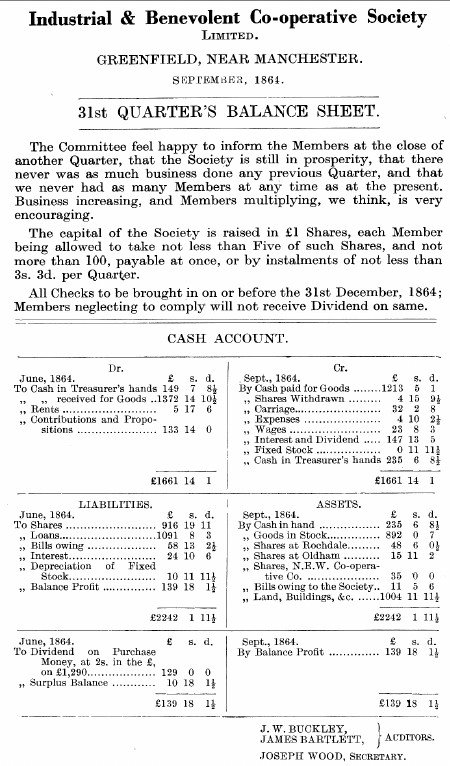
|
